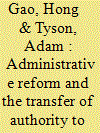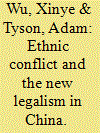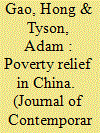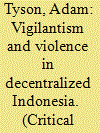|
|
|
Sort Order |
|
|
|
Items / Page
|
|
|
|
|
|
|
| Srl | Item |
| 1 |
ID:
156609


|
|
|
|
|
| Summary/Abstract |
In this article, we examine the administrative functions that have been carried out by social organizations (SOs) in China since 2013. We use evidence from Guangdong to demonstrate that the transfer of authority to SOs is selective, tends to create more burdens for local government, and generally does not lead to greater autonomy for SOs. We focus on five types of SOs that are undertaking new administrative functions with varying degrees of operational autonomy, which relates to the consultative authoritarian model proposed by Jessica Teets. Consultative authoritarianism allows for the expansion of relatively autonomous SOs and the development of indirect state control mechanisms. The model is designed to improve governance without democratization by expanding the role played by intermediaries such as SOs in public administration and service delivery. The evidence from Guangdong permits us to conclude that the transfer of authority to SOs allows for innovations in public administration, but that politics continues to motivate government decisions as to which functions are suitable for SOs to undertake, casting doubt on the ability of the Chinese Communist Party to achieve sustainable improvements in local governance and public service provision.
|
|
|
|
|
|
|
|
|
|
|
|
|
|
|
|
| 2 |
ID:
192628


|
|
|
|
|
| Summary/Abstract |
Under President Xi Jinping, the strengthening of the Chinese Communist Party's political control occurs in conjunction with an evolving administrative role for government-affiliated associations. Analysing associations that are subordinate within China's strict hierarchy but which have degrees of operational freedom yields insights into the changing nature of public service and administration in China. Evidence from 63 interviews conducted from 2018 to 2022 with government departments and affiliated associations in the education sector reveals the complexity of state control and degrees of constrained autonomy achieved by affiliated associations. The government exerts control over financing, personnel appointments and core business activities but, over time, associations gain varying degrees of operational autonomy to influence the education agenda and fill gaps in public services. The interdependency and relational variance we find in the case of Ministry of Education-affiliated associations contributes to broader understandings of the complex and fragmentary nature of the Chinese state and public administration.
|
|
|
|
|
|
|
|
|
|
|
|
|
|
|
|
| 3 |
ID:
148779


|
|
|
|
|
| Summary/Abstract |
In October 2014, the Chinese Communist Party committed to the establishment of a “socialist rule of law with Chinese characteristics.” Since then a group of Chinese political elites that we refer to as new legalists has been calling for ethnic conflict to be managed in accordance with the rule of law. This article finds that the deeply embedded and highly politicized problem of ethnic conflict in China lends credence to the legalist position that new law-based approaches are needed, although a number of practical problems arise when attempting to strengthen the rule of law. There are for instance powerful factions in the country supporting the continuation of repressive policies or selective ethnic preferentialism, and there are relatively low levels of legal awareness in ethnic-minority communities and general inadequacies in the Chinese legal system. We argue that an elite group of new legalists in China is attempting to reshape ethnic-minority policy in order to break free from the everyday protean politics of ethnic relations that is based largely on a negative cycle of violent confrontation and financial compensation.
|
|
|
|
|
|
|
|
|
|
|
|
|
|
|
|
| 4 |
ID:
174783


|
|
|
|
|
| Summary/Abstract |
Evidence from Gansu, Hunan, Shandong, and Yunnan provinces shows that subnational authorities in China draw on personal relations to alleviate poverty and legitimize their rule. Through an invasive process of claiming kin, local government officials are required to sign kinship contracts with poor households. The contract links bureaucratic performance reviews to tangible outcomes, creating new incentives and pressures for officials to help lift their adopted families out of poverty. The general aspiration may be to improve bureaucratic processes by establishing direct, transparent connections between state and society, however the authors contend that the invasive and personalized nature of the kinship policy risks disrupting the existing social order and complicating local poverty relief efforts, leading to local variance, extortion and other irregularities.
|
|
|
|
|
|
|
|
|
|
|
|
|
|
|
|
| 5 |
ID:
120843


|
|
|
|
|
| Publication |
2013.
|
| Summary/Abstract |
This article examines the variable powers, positions, and legitimacy of informal authorities in Lombok, Indonesia, most notably tuan guru (Muslim clerics) and their affiliate pamswakarsa (vigilante forces). It argues that recent accounts of tuan guru as peacemakers downplay the complex structural factors that enable outbreaks of ethno-religious violence in the first place. By analyzing successive permutations of disorder, traceable back to the colonial era, this article helps locate and give context to the current policing and political dilemmas surrounding vigilantism in Indonesia. It then demonstrates how, in the era of decentralization, local and provincial authorities endeavor to domesticate pamswakarsa groups and their charismatic leaders. Finally, this article concludes that renewed spiritual expansionism, such as the renovation of Hindu temple sanctuaries in Lombok, elicits extreme responses from tuan guru. These responses provide renewed impetus for vigilante violence, strain interisland relations, and, at times, stifle economic development.
|
|
|
|
|
|
|
|
|
|
|
|
|
|
|
|
|
|
|
|
|